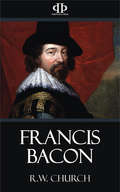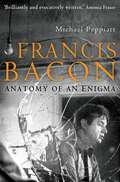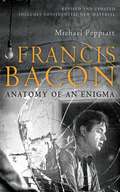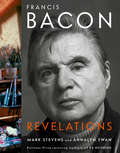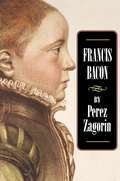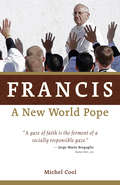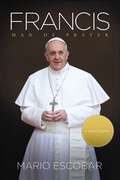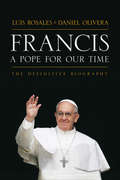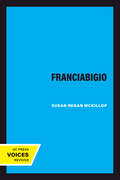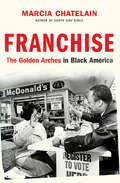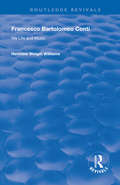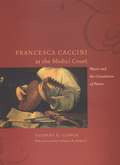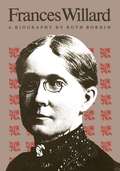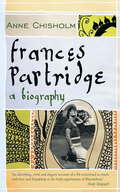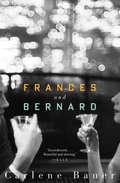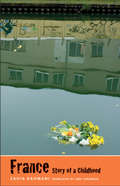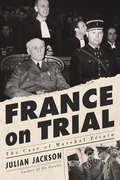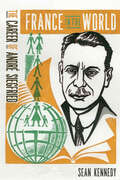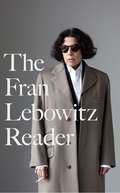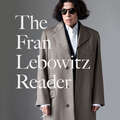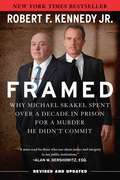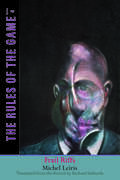- Table View
- List View
Francis Bacon
by R. W. ChurchThe life of Francis Bacon is one which it is a pain to write or to read. It is the life of a man endowed with as rare a combination of noble gifts as ever was bestowed on a human intellect; the life of one with whom the whole purpose of living and of every day's work was to do great things to enlighten and elevate his race, to enrich it with new powers, to lay up in store for all ages to come a source of blessings which should never fail or dry up; it was the life of a man who had high thoughts of the ends and methods of law and government, and with whom the general and public good was regarded as the standard by which the use of public power was to be measured; the life of a man who had struggled hard and successfully for the material prosperity and opulence which makes work easy and gives a man room and force for carrying out his purposes.
Francis Bacon: Anatomy Of An Enigma (Cla.de.ma Ser.)
by Michael PeppiattPublished in 1996, Francis Bacon: Anatomy of an Enigma was the first in-depth study of the artist's life. It has not been superseded.In this substantially revised, updated edition - to coincide with the artist's centenary, which will be celebrated from autumn 2008 through summer 2009 - Peppiatt will incorporate confidential material Bacon gave him, which he did not include in the first edition. This valuable, first-hand information comes from the hundreds of conversations Bacon had with Peppiatt, often late into the night, over thirty years, particularly during the periods Bacon spent living and working in Paris. It includes insights into Bacon's intimate relationships, his artistic convictions and his general view of life, as well as his acerbic comments on his contemporaries.Peppiatt will draw on some of the fascinating information that has become available in the fifteen years since the artist died. Once jealously guarded by the artist himself, the contents of Bacon's studio can now be freely consulted; Peppiatt has had privileged access to these archives, and he will show how a number of recent discoveries - including wholly unexpected source material - have radically changed the way we look at Bacon's work. Similarly, his recent research into the artist's background - his tortured affair with the sadistic Peter Lacy in Tangier, for instance, and the baffling circumstances of his death in Madrid - will shed light on unexplored areas of Bacon's life and work. Peppiatt will also unveil new information from several people who knew Bacon intimately and who have never gone on record previously.
Francis Bacon: Anatomy of an Enigma (Cla.de.ma Ser.)
by Michael PeppiattFrancis Bacon was one of the most powerful and enigmatic creative geniuses of the twentieth century. Immediately recognizable, his paintings continue to challenge interpretations and provoke controversy. Bacon was also an extraordinary personality. Generous but cruel, forthright yet manipulative, ebullient but in despair: He was the sum of his contradictions. This life, lived at extremes, was filled with achievement and triumph, misfortune and personal tragedy. In his revised and updated edition of an already brilliant biography, Michael Peppiatt has drawn on fresh material that has become available in the sixteen years since the artist's death. Most important, he includes confidential material given to him by Bacon but omitted from the first edition. Francis Bacon derives from the hundreds of occasions Bacon and Peppiatt sat conversing, often late into the night, over many years, and particularly when Bacon was working in Paris. We are also given insight into Bacon's intimate relationships, his artistic convictions and views on life, as well as his often acerbic comments on his contemporaries.
Francis Bacon: Anatomy of an Enigma
by Michael PeppiattPublished in 1996, Francis Bacon: Anatomy of an Enigma was the first in-depth study of the artist's life. It has not been superseded.In this substantially revised, updated edition - to coincide with the artist's centenary, which will be celebrated from autumn 2008 through summer 2009 - Peppiatt will incorporate confidential material Bacon gave him, which he did not include in the first edition. This valuable, first-hand information comes from the hundreds of conversations Bacon had with Peppiatt, often late into the night, over thirty years, particularly during the periods Bacon spent living and working in Paris. It includes insights into Bacon's intimate relationships, his artistic convictions and his general view of life, as well as his acerbic comments on his contemporaries.Peppiatt will draw on some of the fascinating information that has become available in the fifteen years since the artist died. Once jealously guarded by the artist himself, the contents of Bacon's studio can now be freely consulted; Peppiatt has had privileged access to these archives, and he will show how a number of recent discoveries - including wholly unexpected source material - have radically changed the way we look at Bacon's work. Similarly, his recent research into the artist's background - his tortured affair with the sadistic Peter Lacy in Tangier, for instance, and the baffling circumstances of his death in Madrid - will shed light on unexplored areas of Bacon's life and work. Peppiatt will also unveil new information from several people who knew Bacon intimately and who have never gone on record previously.
Francis Bacon: Revelations
by Mark Stevens Annalyn SwanA decade in the making: the first comprehensive look at the life and art of Francis Bacon, one of the iconic painters of the twentieth century--from the Pulitzer Prize-winning authors of de Kooning: An American Master. Francis Bacon created an indelible image of mankind in modern times, and played an outsized role in both twentieth century art and life--from his public emergence with his legendary Triptych 1944 (its images "so unrelievedly awful" that people fled the gallery), to his death in Madrid in 1992.Bacon was a witty free spirit and unabashed homosexual at a time when many others remained closeted, and his exploits were as unforgettable as his images. He moved among the worlds of London's Soho and East End, the literary salons of London and Paris, and the homosexual life of Tangier. Through hundreds of interviews, and extensive new research, the authors probe Bacon's childhood in Ireland (he earned his father's lasting disdain because his asthma prevented him from hunting); his increasingly open homosexuality; his early design career--never before explored in detail; the formation of his vision; his early failure as an artist; his uneasy relationship with American abstract art; and his improbable late emergence onto the international stage as one of the great visionaries of the twentieth century. In all, Francis Bacon: Revelations gives us a more complete and nuanced--and more international--portrait than ever before of this singularly private, darkly funny, eruptive man and his equally eruptive, extraordinary art. Bacon was not just an influential artist, he helped remake the twentieth-century figure.
Francis Bacon
by Perez ZagorinFrancis Bacon (1561-1626), commonly regarded as one of the founders of the Scientific Revolution, exerted a powerful influence on the intellectual development of the modern world. He also led a remarkably varied and dramatic life as a philosopher, writer, lawyer, courtier, and statesman. Although there has been much recent scholarship on individual aspects of Bacon's career, Perez Zagorin's is the first work in many years to present a comprehensive account of the entire sweep of his thought and its enduring influence. Combining keen scholarly and psychological insights, Zagorin reveals Bacon as a man of genius, deep paradoxes, and pronounced flaws. The book begins by sketching Bacon's complex personality and troubled public career. Zagorin shows that, despite his idealistic philosophy and rare intellectual gifts, Bacon's political life was marked by continual careerism in his efforts to achieve advancement. He follows Bacon's rise at court and describes his removal from his office as England's highest judge for taking bribes. Zagorin then examines Bacon's philosophy and theory of science in connection with his project for the promotion of scientific progress, which he called "The Great Instauration." He shows how Bacon's critical empiricism and attempt to develop a new method of discovery made a seminal contribution to the growth of science. He demonstrates Bacon's historic importance as a prophetic thinker, who, at the edge of the modern era, predicted that science would be used to prolong life, cure diseases, invent new materials, and create new weapons of destruction. Finally, the book examines Bacon's writings on such subjects as morals, politics, language, rhetoric, law, and history. Zagorin shows that Bacon was one of the great legal theorists of his day, an influential philosopher of language, and a penetrating historian. Clearly and beautifully written, the book brings out the richness, scope, and greatness of Bacon's work and draws together the many, colorful threads of an extraordinarily brilliant and many-sided mind.
Francis, a New World Pope: A New World Pope
by Michel CoolAfter Pope Benedict XVI's historic resignation of the papal office in February 2013, the College of Cardinals elected Jorge Mario Bergoglio, Archbishop of Buenos Aires -- now Pope Francis -- as the new leader of the world's estimated 1.2 billion Roman Catholics.But who is this new Pope -- really?In Francis, a New World Pope, Michel Cool surveys Pope Francis's journey to the papacy, his convictions, his personality, his writings, and the challenges he faces in his new office -- governance of the church, new evangelization in secularized societies, and poverty, among many others.Peppered throughout with anecdotes that demonstrate the humanity of Pope Francis -- and his sensitivity to those who are most distant from the Church -- this book paints a vibrant portrait of the man who has chosen for his motto miserando atque eligendo: "lowly but chosen."
Francis: Man of Prayer
by Mario EscobarFirst Jesuit. First Latin American. And a new pope who chose as his first act a simple request: please pray for me.The recent resignation of Pope Benedict XVI took the world by surprise and for good reason. More than 600 years had passed since a pope last left his post.Jorge Mario Bergoglio, now Pope Francis, is a man of prayer, a man of action, and a humble man who has always promoted others over himself. In fact, it was Bergoglio who bowed out of the running in the papal election of 2005 to facilitate the rise of Benedict XVI.However, the new pope faces a Catholic Church in crisis--a church that has lost the media pull of John Paul II and is still hounded by pedophile scandals and the filtration of documents from former papal administrations. His first year may not be an easy one, but neither this man nor the church itself has ever shied away from the challenges thrust upon them.Pope Francis is austere and simple but has vast theological training. He is a man of his time but one who also travels by subway and bus just like any other citizen. Tirelessly fighting poverty and marginalization, he is a beacon of hope for the poor, persecuted sectors of the church. Has a Catholic spring finally arrived after a very long winter?Francis is the complete biography of a humble man who has suddenly become one of the most powerful and influential men on the planet.
Francis: A Pope for Our Time
by Luis Rosales Daniel OliveraFrancis: A Pope for Our Time, The Definitive Biography incisively chronicles Pope Francis' ancestry, youth, call to faith, humble beginnings with the Society of Jesus, and rise through Argentina's ecclesiastical ranks, all the way to the Vatican. The book emphasizes His Holiness' Jesuit background of humility, poverty, and service that stands to reform the Vatican's long history of lavish excess. The book illustrates Pope Francis' pastoral commitment to society's most underprivileged and disenfranchised.
Franciabigio (California Studies in the History of Art #16)
by Susan Regan McKillopThis title is part of UC Press's Voices Revived program, which commemorates University of California Press’s mission to seek out and cultivate the brightest minds and give them voice, reach, and impact. Drawing on a backlist dating to 1893, Voices Revived makes high-quality, peer-reviewed scholarship accessible once again using print-on-demand technology. This title was originally published in 1974.
Franchise: The Golden Arches In Black America
by Marcia ChatelainFrom civil rights to Ferguson, Franchise reveals the untold history of how fast food became one of the greatest generators of black wealth in America. Often blamed for the rising rates of obesity and diabetes among black Americans, fast food restaurants like McDonald’s have long symbolized capitalism’s villainous effects on our nation’s most vulnerable communities. But how did fast food restaurants so thoroughly saturate black neighborhoods in the first place? In Franchise, acclaimed historian Marcia Chatelain uncovers a surprising history of cooperation among fast food companies, black capitalists, and civil rights leaders, who—in the troubled years after King’s assassination—believed they found an economic answer to the problem of racial inequality. With the discourse of social welfare all but evaporated, federal programs under presidents Johnson and Nixon promoted a new vision for racial justice: that the franchising of fast food restaurants, by black citizens in their own neighborhoods, could finally improve the quality of black life. Synthesizing years of research, Franchise tells a troubling success story of an industry that blossomed the very moment a freedom movement began to whither.
Francesco Bartolomeo Conti: His Life and Music (Routledge Revivals)
by Hermine Weigel WilliamsFirst Published in 1999, Hermine Weigel Williams’ study draws on more than thirty years of research to fill this noticeable lacuna , and presents here the first full scale life and works of the composer for over ninety years. Part One of the book surveys the biographical aspects of Conti’s career. Appointed court theorist at the age of nineteen, Conti was promoted to court composer in 1713-14. Williams examines Conti’s creative collaborations with some of the leading poet-librettists of the day, and the influence of his music that can be identified in works by Telemann, Bach and Handel. Part Two comprises close analyses of Conti’s compositions: his instrumental music, cantatas, operas, intermezzos, oratorios and sacred music. Williams reveals Conti as a composer who constantly experimented with a wide range of French, German and Italian ideas and techniques to create his own diverse musico-dramatic style.
Francesca Caccini at the Medici Court
by Catharine R. Stimpson Suzanne G. CusickA contemporary of Shakespeare and Monteverdi, and a colleague of Galileo and Artemisia Gentileschi at the Medici court, Francesca Caccini was a dominant musical figure there for thirty years. Dazzling listeners with the transformative power of her performances and the sparkling wit of the music she composed for more than a dozen court theatricals, Caccini is best remembered today as the first woman to have composed opera. Francesca Caccini at the Medici Court reveals for the first time how this multitalented composer established a fully professional musical career at a time when virtually no other women were able to achieve comparable success. Suzanne G. Cusick argues that Caccini's career depended on the usefulness of her talents to the political agenda of Grand Duchess Christine de Lorraine, Tuscany's de facto regent from 1606 to 1636. Drawing on Classical and feminist theory, Cusick shows how the music Caccini made for the Medici court sustained the culture that enabled Christine's power, thereby also supporting the sexual and political aims of its women. In bringing Caccini's surprising story so vividly to life, Cusick ultimately illuminates how music making functioned in early modern Italy as a significant medium for the circulation of power.
Frances Willard
by Ruth BordinFrances Willard (1839-98), national president of the WCTU, headed the first mass organization of American women, and through the work of this group, women were able to move into public life by 1900. Willard inspired this process by her skillful leadership, her broad social vision, and her traditional womanly virtues. Although a political maverick, she won the support of the white middle class because she did not appear to challenge society's accepted ideals.
Frances Partridge: The Biography
by Anne ChisholmFrances Partridge: the last survivor of the Bloomsbury group - the authorised biography.Frances Partridge was one of the great British diarists of the 20th century. She became part of the Bloomsbury group encountering Virginia Woolf, Lytton Strachey, the Bells, Roger Fry, Maynard Keynes, Dora Carrington and Ralph Partridge. She and Ralph fell in love and married in 1933. During the Second World War they were committed pacifists and they enjoyed the happiest times of their lives together, entertaining friends such as E.M. Forster, Robert Kee and Duncan Grant.Despite losing both her husband and son, Frances maintained an astonishing appetite for life, whether for her friends, travelling, botany, or music. Her diaries (which she continued to write until her death in 2004) chronicle her life from the 1930s onwards. Their publication brought her recognition and acclaim, and earned her the right to be seen not as a minor character on the Bloomsbury stage but standing at the centre of her own.
Frances Partridge: The Biography
by Anne ChisholmFrances Partridge: the last survivor of the Bloomsbury group - the authorised biography.Frances Partridge was one of the great British diarists of the 20th century. She became part of the Bloomsbury group encountering Virginia Woolf, Lytton Strachey, the Bells, Roger Fry, Maynard Keynes, Dora Carrington and Ralph Partridge. She and Ralph fell in love and married in 1933. During the Second World War they were committed pacifists and they enjoyed the happiest times of their lives together, entertaining friends such as E.M. Forster, Robert Kee and Duncan Grant.Despite losing both her husband and son, Frances maintained an astonishing appetite for life, whether for her friends, travelling, botany, or music. Her diaries (which she continued to write until her death in 2004) chronicle her life from the 1930s onwards. Their publication brought her recognition and acclaim, and earned her the right to be seen not as a minor character on the Bloomsbury stage but standing at the centre of her own.
Frances and Bernard
by Carlene BauerA &“dazzling and gorgeously written&” novel of art, faith, and life-changing friendship inspired by the correspondence of Flannery O&’Connor and Robert Lowell (Ann Packer). In the summer of 1957, two writers are immersed in their craft at an artist&’s colony nestled in upstate New York when chance brings them together. Frances, a country northerner, as committed to her solitude as she is her faith, and Bernard, a gregarious Bostonian with a propensity towards mania and grand gestures, find themselves forming a friendship, and then a courtship, as they each discover a kindred spirit beneath the obvious differences between them. But, as they become inexorably entwined in each other&’s lives, they struggle with the dependence of their romance and the conflict it causes with their own dreams. Inspired by the lives of Flannery O&’Connor and Robert Lowell, who formed an unlikely connection after meeting at Yaddo in the late fifties, and told in a series of intimate letters between the protagonists, Frances and Bernard is a touching and bittersweet look at what happens when love, desire, hope, faith, and friendship collide. &“Recalling 20th-century masters like Graham Greene and Walker Percy . . . Bauer is herself a distinctive stylist who can write about Simone Weil or Kierkegaard with wit and charm.&” —The New York Times Book Review &“Engrossing . . . Funny, sweet and sad. A lovely surprise.&” —Publishers Weekly, starred review &“A novel of stunning subtlety, grace, and depth . . . compos[ed in] dueling letters of breathtaking wit, seduction, and heartbreak.&” —Booklist, starred review
France, Story of a Childhood
by Lara Vergnaud Zahia RahmaniThis moving tale of imprisonment and escape, persecution and loss, is narrated by the daughter of an alleged Harki, an Algerian soldier who fought for the French during the Algerian War for Independence. It was the fate of such men to be twice exiled, first in their homeland after the war, and later in France, where fleeing Harki families sought refuge but instead faced contempt, discrimination, and exclusion. Zahia Rahmani blends reality and imagination in her writing, offering a fictionalized version of her own family's struggle. Lara Vergnaud's beautiful translation from the French perfectly captures the voices and emotions of Rahmani's childhood in a foreign land. While the author delves deeply into the past, she also indicts present-day France and Algeria. From the unique perspective of the daughter of an accused Harki, she examines France's complex and controversial history with its former colony and offers new insight into the French civil riots of 2005. She makes a stirring plea for understanding between generations and cultures, and especially for an end to the destructive practice of condemning children for their fathers' actions and beliefs.
France on Trial: The Case of Marshal Pétain
by Julian JacksonFor three weeks in July 1945 all eyes were fixed on a humid Paris, where France’s disgraced former head of state was on trial, accused of masterminding a plot to overthrow democracy. Would Philippe Pétain, hero of Verdun, be condemned as the traitor of Vichy?In the terrible month of October 1940, few things were more shocking than the sight of Marshal Philippe Pétain—supremely decorated hero of the First World War, now head of the French government—shaking hands with Hitler. Pausing to look at the cameras, Pétain announced that France would henceforth collaborate with Germany. “This is my policy,” he intoned. “My ministers are responsible to me. It is I alone who will be judged by History.”Five years later, in July 1945, after a wave of violent reprisals following the liberation of Paris, Pétain was put on trial for his conduct during the war. He stood accused of treason, charged with heading a conspiracy to destroy France’s democratic government and collaborating with Nazi Germany. The defense claimed he had sacrificed his personal honor to save France and insisted he had shielded the French people from the full scope of Nazi repression. Former resisters called for the death penalty, but many identified with this conservative military hero who had promised peace with dignity.The award-winning author of a landmark biography of Charles de Gaulle, Julian Jackson uses Pétain’s three-week trial as a lens through which to examine one of history’s great moral dilemmas. Was the policy of collaboration “four years to erase from our history,” as the prosecution claimed? Or was it, as conservative politicians insist to this day, a sacrifice that placed pragmatism above moral purity? As head of the Vichy regime, Pétain became the lightning rod for collective guilt and retribution. But he has also been an icon of the nationalist right ever since. In France on Trial, Jackson blends courtroom drama, political intrigue, and brilliant narrative history to highlight the hard choices and moral compromises leaders make in times of war.
France in the World: The Career of André Siegfried
by Sean M. KennedyAndré Siegfried (1875–1959) was a leading figure in French academic and cultural life for over five decades. A world traveller who trained as a geographer, Siegfried became a leading political scientist and prominent newspaper columnist. As a long-time professor at Sciences Po, he shaped generations of his country’s elite. France in the World explores the life and career of André Siegfried. An innovator in the field of political science, he established himself as France’s leading interpreter of the English-speaking world. Often likened to Alexis de Tocqueville, Siegfried published influential studies of the United States, Canada, Great Britain, and New Zealand, striving to understand France’s place in a changing global context. Siegfried was a cosmopolitan promoter of liberalism and individual freedom. But at the same time he perceived France to be the core of a Western civilization whose leadership and values were threatened by Americanization, anti-imperial nationalism, and non-white immigration. By following Siegfried’s long career and examining the breadth of his writings, Sean Kennedy shows how his racial and ethnic essentialism was a unifying aspect of his life’s work. That these ideas were considered unremarkable for most of his lifetime offers a powerful illustration of how racist thinking permeated mainstream French republicanism.Exploring the many facets of Siegfried’s career, France in the World examines the entanglement of liberal and racist thinking during an era that witnessed political extremism and a rapidly changing international order.
The Fran Lebowitz Reader
by Fran LebowitzAcerbic, wisecracking and hilarious, this is the definitive essay collection from New York legend and satirist, Fran Lebowitz, star of Martin Scorsese's hit Netflix series, Pretend It's a City.'The gold standard for intelligence, efficiency and humour. Now and forever' DAVID SEDARIS'She's inexhaustible - her personality, her knowledge, her brilliance, most of all her humour' MARTIN SCORSESE'The rare example of a legend living up to her own mythology. She really is THAT funny' HADLEY FREEMANLebowitz turns her trademark caustic wit to the vicissitudes of life - from children ('rarely in the position to lend one a truly interesting sum of money') to landlords ('it is the solemn duty of every landlord to maintain an adequate supply of roaches'). And her attitude to work is the perfect antidote to our exhausting culture of self-betterment ('3.40pm. I consider getting out of bed. I reject the notion as being unduly vigorous. I read and smoke a bit more').'Great people talk about ideas, average people talk about things and small people talk about wine''Think before you speak. Read before you think' 'All God's children are not beautiful. Most of God's children are, in fact, barely presentable' 'There is no such thing as inner peace. There is only nervousness and death''The opposite of talking isn't listening. The opposite of talking is waiting'
The Fran Lebowitz Reader
by Fran LebowitzAcerbic, wisecracking and hilarious, this is the definitive essay collection from New York legend and satirist, Fran Lebowitz, star of Martin Scorsese's hit Netflix series, Pretend It's a City.'The gold standard for intelligence, efficiency and humour. Now and forever' DAVID SEDARIS'She's inexhaustible - her personality, her knowledge, her brilliance, most of all her humour' MARTIN SCORSESE'The rare example of a legend living up to her own mythology. She really is THAT funny' HADLEY FREEMANLebowitz turns her trademark caustic wit to the vicissitudes of life - from children ('rarely in the position to lend one a truly interesting sum of money') to landlords ('it is the solemn duty of every landlord to maintain an adequate supply of roaches'). And her attitude to work is the perfect antidote to our exhausting culture of self-betterment ('3.40pm. I consider getting out of bed. I reject the notion as being unduly vigorous. I read and smoke a bit more').'Great people talk about ideas, average people talk about things and small people talk about wine''Think before you speak. Read before you think' 'All God's children are not beautiful. Most of God's children are, in fact, barely presentable' 'There is no such thing as inner peace. There is only nervousness and death''The opposite of talking isn't listening. The opposite of talking is waiting'
Framing the Rhetoric of a Leader
by Marta DeganiBased on a selection of 30 election campaign speeches during Obama's first run for the American presidency in 2008, this book investigates the Democratic presidential candidate's much celebrated rhetoric from a cognitive semantics point of view.
Framed: Why Michael Skakel Spent Over a Decade in Prison for a Murder He Didn't Commit
by Robert F. Kennedy Jr.On Halloween, 1975, fifteen-year-old Martha Moxley’s body was found brutally murdered outside her home in swanky Greenwich, Connecticut. Twenty-seven years after her death, the State of Connecticut spent some $25 million to convict her friend and neighbor, Michael Skakel, of the murder. The trial ignited a media firestorm that transfixed the nation. Now Skakel’s cousin Robert F. Kennedy, Jr., solves the baffling whodunit and clears Michael Skakel’s name. In this revised edition, which includes developments following the Connecticut Supreme Court decision, Kennedy chronicles how Skakel was railroaded amidst a media frenzy and a colorful cast of characters—from a crooked cop and a narcissistic defense attorney to a parade of perjuring witnesses.
Frail Riffs: The Rules of the Game, Volume 4 (The Margellos World Republic of Letters #4)
by Michel LeirisThe fourth and final volume of Michel Leiris’s renowned autobiography, now available in English for the first time, translated by Richard Sieburth Ex-surrealist and maverick anthropologist Michel Leiris (1901–1990) crafted his multivolume autobiography over the course of thirty-five years, profoundly influencing generations of French writers, from Sartre and Beauvoir to Modiano and Ernaux. In this fourth and final volume, Richard Sieburth completes the project of bringing Leiris’s monumental experiment in self-portraiture into English. With wit and playfulness, Leiris assembled a scrapbook of fragments—journal extracts, travel notes, transcriptions of dreams, poems—to document the vagaries of a life committed to the difficult marriage of poetry and revolutionary politics, which he witnessed firsthand in Mao’s China, Castro’s Cuba, and on the Paris streets in May ’68. Frail Riffs is a jazz improvisation on the twilight of a life, at once a painstaking self-examination and a chronicle of a century. As Leiris wrote, it is "neither a private diary nor a formal work, neither an autobiographical narrative nor a work of the imagination, neither prose nor poetry, but all this at the same time. . . . A perpetual work in progress.&rdquo
